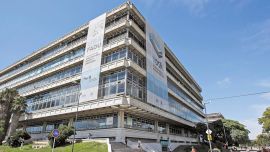Pressure on the government ramped up this week as officials from Argentina and the International Monetary Fund agreed to go back to the drawing board again on the country’s mega US$44-billion programme, with the punishing drought now expected to push the economy into recession.
All options are said to be on the table for the upcoming fifth review of the record IMF programme, including discussions on disbursements, though the Kirchnerite wing of the ruling Frente de Todos coalition is pressuring President Alberto Fernández’s administration to demand more leeway from the multilateral lender.
Underlining the tensions in the ruling coalition over the programme, Interior Minister Eduardo ‘Wado’ de Pedro called this week for the deal to be “re-discussed.”
"I understand that it is a rather complex situation because [former president Mauricio Macri’s 2015-2019 coalition] Cambiemos left us a debt with the agreement proposed by the IMF, which is an inflationary agreement," said the minister, who has close ties to Vice-President Cristina Fernández de Kirchner.
"Everything that the agreement proposes we know is a vicious circle that ends up being inflationary. So everything has to be re-discussed" he told a local radio station.”
Piling on the pressure, De Pedro went on to criticise officials who “don’t work,” and said the government must do more to help the most vulnerable sectors of society who are suffering from a runaway inflation rate that totals more than 104 percent over the last 12 months and falling purchasing power.
Officials in Buenos Aires and Washington DC now accept the deal will have to be redrawn, with Fund officials now accepting internally that existing targets and disbursements outlined in the deal will be impossible to meet.
Economy Minister Sergio Massa met with IMF First Deputy Managing Director Gita Gopinath and IMF Managing Director Kristalina Georgieva on the sidelines of the lender’s spring meetings last week to propose a renegotiation and underline the economic impact of Argentina’s worst drought on record.
It’s another setback for Argentina’s programme, coming less than two weeks after the IMF changed a key target for the third time since the deal began about a year ago. During that review, IMF staff and Argentine officials cut the level of net reserve accumulation, or cash stockpile, needed to be built up at the Central Bank this year to US$2.6 billion from US$4.8 billion previously.
As of April 3 when the IMF published its full report, officials kept the key primary fiscal deficit target for this year at 1.9 percent of gross domestic product. Achieving that target “remains essential” to the programme, Gopinath said in a statement on April 1.
Speaking on Monday, President Fernández praised the “enormous” work being done by Massa and his team at the Economy Ministry. He also revealed that the IMF deal, signed in March 2022, contained a so-called “climate clause” that excused Argentina from meeting fiscal targets for reasons beyond the country’s control.
An IMF source, speaking on condition of anonymity, said that the Fund "recognises that this is the worst drought in Argentina's history" and that "all alternatives are on the table."
– TIMES/BLOOMBERG
























Comments